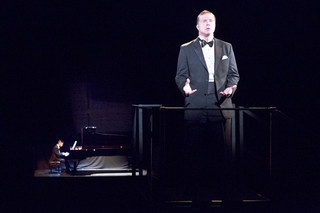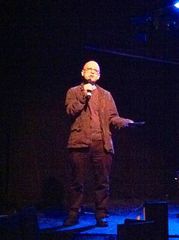|
Back
The Story-Teller New York
Brooklyn Academy of Music Howard Gilman Opera House
09/07/2016 - & September 9, 10, 11, 2016
David Lang: The Loser
“2016 BAM Next Wave Festival”: Rod Gilfry (Baritone), Conrad Tao (Pianist), Conrad Tao (Pianist), Lou Dowling (Bass), Isabel Hage (Viola), Clarice Jensen (Cello), Owen Weaver (Percussion), Karina Cannelakis (Conductor)
Bang On A Can (Producer), Jennifer Tipton (Lighting Design), Jim Findlay (Set Design), Jody Elff (Sound Design), Suzanne Bocanegra (Costume Design), David Lang (Stage Direction)

C. Tao, R. Gilfry (© Richard Termine)
Interviewer: ”We’re giving you a time machine: what period, or moment in musical history, would you travel to and why?”
David Lang: “I would love to sing in the choir at Notre Dame Cathedral, with Léonin and Pérotin, in Paris, at the start of the 13th century. Imagine being there at that moment, when all those sweaty monks in their scratchy wool robes started adding patterns and imitation to Gregorian chant. What were they thinking?”
From The Guardian
Two months ago at a concert for Yale composers, David Lang confessed that he was “less interested in choral music as in choral text”. The composer had his opportunity for composing text–an hour’s worth of words, recited, declaimed, sung, chanted, emoted, dramatized, cried and laughed–in his latest opera, The Loser, premiering last night at the Brooklyn Academy of Art.
Yet David Lang proved true to form, in that one never ever knows what will come out of his fecund, delightful and always mysterious mind. His comment above about the 13th Century masters concerned a historical point. But his music from The Little Match Girl, as well as his other vocal works, has that same Early Medieval sense of voices creeping up on one another as if in cathedral naves, echoed by other unseen voices, disappearing, ineluctably returning in another part of the auditorium.
In effect, they have a mystical aura. But Mr. Lang’s reality is not so much taking us on a trance as to take us to a musical place in which we haven’t ventured before.
The soloist in The Loser, the only vocalist in a form more a monodrama than an opera, doesn’t have that vocal mystery. Rod Gilfry, a baritone with the full voice and richness of the most glorious theatrical singer, was straightforward in speaking a serious, amusing and always curious piece about three people. One is the obsessive figure of Glenn Gould–an indelible figure who the narrator says is almost better than his mentor Vladimir Horowitz. The other is the titular Loser, and the third is the narrator, a third student, who calls himself the Philosopher.
The Philosopher, in eight almost unchanging scenes, stands alone, in tux and cummerbund and black tie, atop a 20-foot staircase which rises from the orchestra pit, his gestures seen on the side of the walls. (BAM can’t sell any tickets for the orchestra, which probably annoys the BAM accountants, but David Lang is David Lang...) At times, one could barely see a pianist in the background–the wondrous young composer/pianist Conrad Tau–but the evening belongs to Mr. Gilfry.

D. Lang (©Poisson Rouge)
And what is the Philosopher’s story? He lives in the shadows of Glenn Gould, he and the person who Gould calls (“in his ruthless but thoroughly open Canadian-American manner”) the Loser. And they live in the shadow of Bach’s Goldberg Variations, as played by Gould. He also speaks about death. Gould dying “at the perfect moment.” The Loser committing suicide (“Suicide is never at the right moment”).
Within the hour, the monologue mainly concerns the piano, and how it can destroy those who don’t live to its potential, the piano ruined by children or those, who, like the Philosopher and Loser give up on the piano after hearing Gould play. The monologue becomes even more dense, though the message is clear enough. The message, in fact, of Amadeus: that certain musicians will always remain wonderful, delightful, charming. While others are blessed by...well, not Mozart’s 18th Century God but by something else, to become Artists. And those who live near them can be broken, devastated by their presence.
How does Mr. Lang handle this? The original piece in German, translated by Jack Dawson, could be read on its own. And indeed, one feels that Mr. Gilfry is indeed telling a story, reciting it with the dramatic gestures of a born story-teller. He could be amusing, ironic, never saccharine, never tragic, merely a man in formal sartorial splendor standing alone, as if in mid-air, regaling us with the study of a suicidal musician.
Behind this, though, Mr. Lang has woven music which–like the mesmeric voices in Little Match Girl–never stand out, never breach the confidence of the story-teller.
Each of the four scenes has a different kind of music. We have at the beginning, the improvisatory meanderings of Mr. Tao’s piano. Barely heard, not attuned to the words, yet lingering in the air behind the words. Further on, one feels–without quotation, without the cheapness of actual style–more ancient forms. Cello and bass in a kind of ostinato, punctuated–what the Medieval dance-masters called puncta–by beats in the percussion.
In another scene, the music sounds vaguely Middle Eastern, actually Turkish, the cellos and bass vaguely (but never literally) following the words of the up-and-down recitation of Mr. Gilfry. After that, we have more animation. And at the end, the spotlight finally comes down on Mr. Tao at the piano on the ground behind the elevated speaker himself still on his winding staircase.
The 60-odd minutes are meant, I would gather, as a major work by David Lang, whose own fascination with words and words cum music, is a never-ending quest. Yet, while I was mesmerized by the quality of the writing, the splendid vocalizations by Mr. Gilfry and the ensemble behind him, it is never (forgive me) an engaging work. Although Mr. Lang claims that text is forefront in his mind, his particular genius is almost a cinematic kind. Not “movie music” (certainly not the mundane “Simple Song” for which he was nominated for an Oscar) but the transportation of his inspiration bringing us to unknown (and quite amiable) places in the non-earthly universe. The Loser is a work of narration, and listening carefully, one hears verbal rather than musical ideas.
In that sense, Mr. Lang has crossed another threshold, and one looks forward to yet another stage in his wondrous career. Though, throughout The Loser, I couldn’t surrender entirely, and (mea culpa) thought wistfully of Mr. Lang’s other creations where words and harmonies coalesced into his singular visions.
Harry Rolnick
|